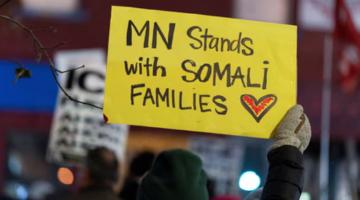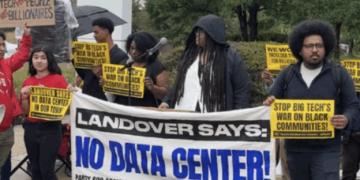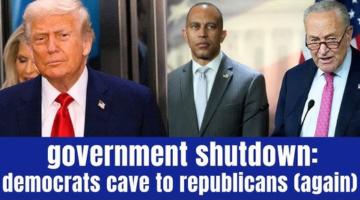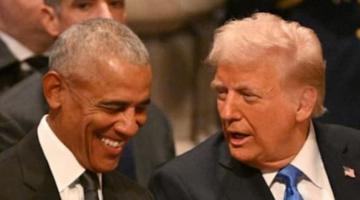BAR Executive Editor Margaret Kimberley talks to Ajamu Baraka, BAR Editor and Columnist about the upcoming presidential election and how the outcome will impact international and domestic policy. Ajamu provides his analysis on Palestine, the Ukraine/Russia war, U.S. imperialism in Africa, police militarism, and the federal prosecution of the Uhuru 3.
Margaret Kimberley: I'm speaking with Black Agenda Report contributing editor Ajamu Baraka. As the presidential election will take place in about two months, we need to discuss the prospects of peace, if any, under a Harris or Trump administration, but specifically in Palestine and in the West Asia region, but Ukraine is still an issue, more than two years after Russia's special military operation began. Who is in charge of the US as Ukraine undertakes an incursion into Russia, and what does this mean for the future? Also, we'll talk about AFRICOM, the US Africa Command, which was founded in October of 2008 in the waning days of the George W Bush administration, but under Obama and other presidents, has grown significantly. Also, how does this impact domestic policy, with the 1033 program giving surplus military equipment to police departments and the IDF training of police forces, why do we have a more than $800 billion military budget, which, of course, is a leading cause of austerity. Ultimately, all of these topics impact us domestically, as there is repression of journalists in the US and in other allegedly democratic nations, and we see the repression in the upcoming trial of the Uhuru 3 in Tampa, Florida.
So let's start with what's going on and the electoral impacts. If Kamala Harris is the winner, we will not see very much change. If Trump is the winner, we may see some changes. But what are your thoughts? Let's start with Palestine and that region.
Ajamu Baraka: Well, I think that we are not going to see any fundamental change in US policies on Palestine under a Harris or Trump administration. There may be some movement under Trump, who probably sees that the continuation of that conflict is continuing to undermine the historic, from their point of view, breakthrough that was achieved with the so-called Abraham accords.
Trump might be operating from the deluded position that the accords can be salvaged once the war on Palestinians is concluded. But under a Harris administration it is certain that the war will continue until Israel ends it.
It's quite clear that the Biden forces were unable to control Netanyahu. In fact, I think there's circumstantial evidence that suggests that one of the reasons why the neo-liberal oligarchs that fund the Democratic Party turned so viciously against Joe Biden wasn't just because of his debate performance, but the mild opposition that he expressed against the Netanyahu government regarding its plans for the military conquest of the entire Gaza Strip and the red line that Biden originally established with his opposition to the IDF assault on Rafah.
Once that red line was ignored by Netanyahu, Biden’s temporary pause on the transfer of military equipment and bombs to Israel was met with fury from those oligarchs that control the Democrat Party. And so the debate performance became, just like the Watergate with Nixon, it became the mechanism by which they then moved against Biden. I know that's a controversial position, but that's one that seems to me to be somewhat supported by some of the moves that were made by the party bosses that forced the coup in the Democratic Party.
So you know, the Harris administration would continue the surrendering of US interests in the so called Middle East, and the inability to completely control any government in Israel. So for the Gaza situation, for Palestine, there'll be no change in terms of US policies, and no significant change. It will still be hegemony of the Israeli fascists, and just a slight alteration if there was, in fact, a Trump administration, and that's something that people have to be aware of that are falling prey to the phony notion that there's some kind of sensitivity on the part of the Harris faction to the plight of Palestinians. I think she made it quite clear in her speech and subsequent interview that there'll be no alteration and their approach to giving complete support to whatever the Israelis are doing, and we see that as a consequence of that perceived weakness on the part of a Harris and Biden administration that helps to explain the assaults by the IDF on the West Bank.
MK: And so this is a complete and utter mess, but it's something that was cooked up and now supported in Washington, and Joe Biden, who is President of the United States until next January, seems to no longer be involved. It's very odd. Well, this is an odd circumstance, isn't it, that he was pushed out of his reelection campaign, but he does not seem to be the person in charge. And there are some things you mentioned about Ukraine. Obviously, Ukraine doesn't do anything without the US giving permission. So we see this escalation there. We don't know who's in charge, but I've also wondered if the election itself is directing policy, such as it is.
They are, it seems, in a hurry to try to get a Ukrainian victory or perhaps a better stalemate. I'm not sure what it is they're doing, but I wonder if their directions to the Ukrainians are a result of an election looming in just a couple of months.
AB: There seem to be a panic on the part of the Ukrainians and some elements in the US foreign policy and intelligence agencies who are trying to enhance the negotiating posture of the Ukrainians, driven primarily by the possibility of a Trump victory, and the Trump forces have made it quite clear that they want to see a resolution of this conflict and this, I think, is what's driving some of the policy, as disjointed as that policy has been in Ukraine. There's some reports that suggest that the US was somewhat caught off guard in terms of the incursion into the Kursk region. I don't really buy that.
There seems to be a split among the US military ranks, regarding the wisdom of allowing that, encouraging it to take place, and that it helped to undermine the ability of the Ukrainians to hold off the increasing intensity of the Russian counter offensive in eastern Ukraine. I think it's becoming clear now that those Kursk forces are going to be and have already been isolated, and are leading to the overall weakness of the ability of the Ukrainian forces to resist the Russians on the Eastern Front.
So there are splits in the administration, splits in the US state regarding the wisdom of the current policy in Ukraine. But again, as you said in your your question, most of this seems to be driven by domestic politics, and that's also indicates why it's so important that there's domestic opposition to the ongoing genocide in in Gaza, because, again, it is domestic politics that will determine to what degree the US will be supporting and driving these war policies in in Gaza, in the West Bank, and in and in Ukraine.
MK: You know, it's interesting. Trump gives the impression that he would have a different policy in Ukraine, but we can't forget that he is the one who orchestrated the most recent tranche of money to the Ukrainians. He beat back opposition amongst Republicans, they all turned on a dime and continued this bipartisan policy. And I believe it is more important to look at what he did, actually, as the Republican nominee, than to think that he will do anything differently as president, regardless of what he says on the campaign trail.
AB: That's a very important point. I would probably argue that his position on that last tranche of money for Ukraine was also driven by domestic political concerns and interests. This was a clear indication of the agreement, the deal, if you will, that's been struck with the US oligarchy that suggests that they recognized that Trump had a strong possibility of re-assuming office and part of getting their financial support and to lessen their political opposition was that he decided to go along with them and ordered his forces not to oppose that last $60 billion or so for Ukraine, so, you're right.
You have to look at what's actually being done that was a significant change in direction. So then the question becomes, why was that done in that way? And I argue that this was another indication of the bipartisan collaboration, the bipartisan subordination of policy to the needs and aspirations of the oligarchy, and that they had made a decision that Trump was probably going to win and that they needed to have closure on this Ukrainian situation. So I do believe that this situation will be closed out. The Ukrainian state has been reduced to a rump state. It is being plundered now by US and Western capital, and that will continue. The boundaries in eastern Ukraine are going to be fixed which means that Ukraine’s surrendering to the U.S. geopolitical agenda will result in it losing a third of their territory. They have lost hundreds of thousands of lives and the destruction of their state.
MK: And of course, if we're talking about military budgets, we have to talk about austerity. I said the military budget was more than $800 billion. It's actually hit $900 billion now, so even worse than I said earlier. But austerity seems to be the settled, agreed upon policy by the oligarchy, by the ruling class of the US, and it doesn't matter how much money can be spent in Ukraine or given to Israel or to be used to try to encircle China. It seems that the twin goals are US supremacy around the world and keeping the people here in a weakened state, a state of precarity. These seem to be the twin goals of the oligarchy.
AB: It really is. I mean, the oligarchy has committed itself to using what it sees as its most effective weapon, which is the weapon of militarization. And that's why we see this reflected in the priorities, the budget priorities. You look at any state. You look at any budget in any organization, and the budget reflects what is important for that formation, for that organization, that structure. In the US it is the military that has a disproportionate grip on the US budget, and that will continue because they have embraced this notion of full spectrum dominance and to carry that out effectively, they are using their military might. That's why they have more than 800 bases across the planet, and that's why the U.S. has a military budget that now in some estimates has already eclipsed $1 trillion when you start adding in other elements in other parts of the budget.
The other aspect that we have to keep in mind when you have this kind of commitment and you have this disproportionate amount of the budget being devoted to the military, is that the domestic needs of the people in terms of housing and healthcare and education, the environment and climate, they're going to be completely ignored. They're going to just be getting crumbs in comparison. And that's exactly what is happening. The result of the federal budget is one in which they are not in a position to help out the state budgets across the country. And many of these states and locales are, in fact, engaged in austerity. They don't have the resources to address the human rights needs of their populations. And the result is that people are suffering. People are anxious. There's a sense of precarity there among the people that Democrats don't seem to understand why it exists. They talk about how strong the economy is, but the people are still saying, you know, we're not feeling it, that basically, you know, we are living paycheck to paycheck. It has been estimated that 60% of the population is living paycheck to paycheck. Now, if this military budget was not in place, then some of that could bring some relief offered to the people. There could be a federal jobs program, there could be community banks, there could be more public housing that can help undermine the grip that the private housing sector has on rents and mortgages, etc.
But that's not the case when you have the hegemony of militarism. That's why this, this connection between militarism and domestic repression has to be also understood, because when you have a commitment to militarism abroad, you have to have either compliance with the population, ideological compliance, or you have to have repression against those sectors that are opposed to the systematic warmongering that we see and the US has chosen to use both ideological compliance, propping up this Harris person as the face of white power, but also that is buttressed with their full, clear commitment to repression, harassing opposition, charging organizations like the Uhuru 3, the African Peoples Socialist Party, the trial that's going to take place in the next few days, where these activists at this organization have been charged with being foreign agents of Russia because of their consistent opposition to the warmongering of the US in general and the warmongering policies of the US in Ukraine. We see that the activist, Danny Shaw was just harassed at the airport, coming back from London from a Palestinian event in London. In London itself Richard Medhurst was detained and harassed.
Across the country students are being told that if they attempt to exercise their constitutional rights to speech and assembly, they can face severe repression. So this is the kind of need that's reflected in the state's commitment to militarism that has this deleterious impact on human rights domestically. So this is, this is a situation that we are facing that is fraught with real, fascistic realities, and is one in which we've got to have a more sustained focus. People are being diverted away from what is unfolding with the useful idiocy of the Trump campaign and that understanding that it is the neo-liberal, fascistic elements of the oligarchy that are strengthening the state, the alignment between the state and corporate power and the undermining of human rights in this country and globally, and that understanding has to be enhanced if we're going to be able to effectively oppose the last gasps of this dying empire.
MK: You know, you mentioned some of these recent cases of attacks on any dissent from the official narrative, very serious such as the trial of the Uhuru 3 that you mentioned, Richard Medhurst In the UK, who we spoke to on Black Agenda Radio, Mary Kostakidis, a journalist in Australia, a journalist in the UK named Sarah Wilkinson, Danny Shaw in the US, Scott Ritter in the US. These have all happened within the last few weeks. It's hard to believe there's not some coordination with the surveillance state internationally. Do you think the issue is Israel and Palestine? Do you think it's Ukraine? Do you think it's both, or do they just want to shut people up in general?
AB: I think they want to control the narrative, they want to to target and undermine their credibility and silence the voices of dissidents, those of us who are opposed to the systematic violation of human rights, who are opposed to the use of militarism to maintain the hegemony of this 1% of the global population, and so we are in this environment in which the politics of the US and the West has moved so far to the right that these kinds of repressive activities are becoming more and more normalized. They are taking full advantage of that, and so unfortunately, there's going to be a continuation of this, and probably an expansion of these violations, as long as we are not able to to alert the populations to this human rights challenge, this repressive agenda that's being carried out by by the Western oligarchy, led by the US oligarchy.
MK: We've talked about the military budget and austerity. We talked about military bases all over the world, and that means we have to talk about these command structures that the US has placed on the entire world. There's NORTHCOM, SOUTHCOM, INDOPAKCOM, and of course, we have to talk about AFRICOM, the US Africa Command, which began in October of 2008 just a few months before Obama became president. And this is linked, of course, to the 1033 program and sending military equipment into US localities, cities and towns across the country, the IDF training police forces. Talk about AFRICOM and how it's impacting us
AB: Well, all this militarism impacts us domestically, and many people are not aware of the extensive nature of the US global command structure. And if, when they even become aware of it, there seems to be some degree of support for it, because they have internalized this notion of the US being the global police person if you will. That the US is a Benevolent Empire that's only concerned with democracy and human rights. Well that is a lie and one of the positive benefits of Gaza, even though it's unfortunate that the Palestinian people are going to suffer as a consequence, is that the true nature of this empire, the true nature of the Western colonial capitalist project, has been exposed for what it is, a vicious, backward, white supremacist, plundering and parasitic system that has no commitment at all to its own liberal values and ideals. It is only interested in maintaining its ability to extract value from the rest of global humanity.
So this is an awakening that's taking place, and that's, in fact, a good thing for us. So what we are seeing with this militarism, is the weakness, really, of the Western project, because they can no longer maintain hegemony through their cultural and ideological domination, and now they have completely jettisoned those factors and are dependent on militarism and repression. And so this is the the current moment that we’re in and people must understand this and not be diverted away from a deeper understanding of the real interest by these diversions, be it the Trumpian diversion or the joyful diversion of Kamala Harris, where it is quite clear from her last interview that if she was in fact, to win the presidency, she would not be in charge. So the question then becomes, for people, as they understand the system - who is really running things? Where is the real power in this society? And we say it quite clearly, and we have to say it over and over again, it is the oligarchy. It is the capitalist oligarchy that runs things. And this electoral process is just a method to give people the illusion of participation, and that's why it's so important that people understand that if you're going to participate in the electoral process, that you might want to take a look at those alternative campaigns that are raising these kinds of questions that are quite clear in their opposition to the US and European colonial project, who are condemning the militarism and the violence of the police forces across the US and in Europe.
So you know, these are campaigns that deserve the support of the people, because these are campaigns that understand that the real struggle in the US is for real democracy. And so they're going to take advantage of the existing limited bourgeois democracy to raise these questions, to get access to the people, to help with the process of building radical consciousness. And that's what the task is today. That is the importance of the Black Alliance of Peace Month of Action against AFRICOM, so people can understand what the Africa Command is, and the impact it’s having on the African nation, for people to understand why we are opposed to the US participating in in our region, the Americas, with subversion and militarism and why it's important to close down the 76 bases in in our region, and to support the call for a Zone of Peace, that's why the Black Alliance for Peace is spearheading that effort to build a campaign to extract the US from this region, to extract the US military from the region, and to make our region a zone of peace. So these are the alternative people centered popular projects that we have to build. And this is what the Black Alliance for Peace is attempting to do.
MK: And lastly, regarding the election we've talked about the domestic campaign, actually, though, a worldwide campaign in opposition to the US funded Israeli genocide against Gaza, we saw huge protests, particularly on college campuses, where a lot of the repression that we've been discussing took place. How do you see the continuation, actually, the expansion of this genocide as Israel goes into the West Bank? How do you see that impacting the election?
AB: Well, at this point, with the return of the students, I think the Democrats are going to get a surprise, because if the students are able to regroup, and I think that they will be able, and they continue their militant opposition to genocide in in Gaza and in the West Bank, if the students are able to do that and the Uncommitted movement gets committed to principled politics and withholds its support from the Harris campaign because of this continuing support of the murder of their people, the Harris campaign will be devastated. And the campaign should be devastated. Those two elements are going to pave the way, I believe, to a victory on the part of the Trump forces in November. So, yes, it's going to have a significant impact, in my opinion. And not only in Gaza, but also Ukraine. And when that happens the radical alternative will be strengthened, despite the incriminations that initially will be directed at us. Our task will be to organize that new power for the longer-term struggle that has to be waged to defeat the capitalist dictatorship and transform society along socialist lines with freedom, self-determination and authentic de-colonization as the ultimate transformative objectives.
MK: Thank you so much Ajamu.
AB: My pleasure.
Ajamu Baraka is the Chairman of the Coordinating Committee of the Black Alliance for Peace and an editor and contributing columnist for the Black Agenda Report. Baraka serves on the Executive Committee of the U.S. Peace Council and leadership body of the U.S.-based United National Anti-War Coalition (UNAC) and the Steering Committee of the Black is Back Coalition.
Margaret Kimberley is the author of Prejudential: Black America and the Presidents. You can support her work on Patreon and also find it on the Twitter, Bluesky, and Telegram platforms. She can be reached via email at margaret.kimberley@blackagendareport.com.



















